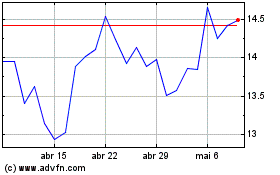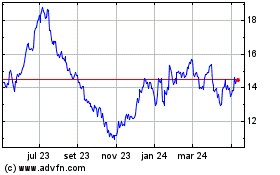Airlines Have the Cash. Now They Need Passengers -- Update
15 Abril 2020 - 6:30PM
Dow Jones News
By Alison Sider
U.S. airlines succeeded in getting billions of dollars of
federal aid, but it will only buy them a few months: Their survival
depends on how quickly passengers return when coronavirus-driven
restrictions ease.
The Treasury said late Tuesday that it had struck an agreement
in principle with 10 major airlines to distribute $25 billion in
payroll assistance that Congress approved in the $2.2 trillion
federal stimulus package last month.
The money will keep workers employed -- airlines that accept the
money are barred from laying off or furloughing staff until
October. It will also give the Treasury a stake in their future,
including up to 12% in American Airlines Group Inc. if the world's
biggest carrier proceeds with its plan to seek a separate
government loan.
However, the carriers may find themselves back in the same dire
position in the fall if demand doesn't improve. With people staying
home to comply with state shelter orders, demand is down as much as
95% and planes are flying nearly empty. Delta Air Lines Inc. and
United Airlines Holdings Inc. are among the airlines that have
warned that they will have to shrink to adjust to a slow
recovery.
American Airlines Chief Executive Doug Parker said Wednesday
there are early signs people are thinking about traveling again,
including some new bookings beyond 90 days out and customer
inquiries about convention travel in the fourth quarter. But it
could be months or years before people are traveling the way they
did before the pandemic hit, according to airlines and
analysts.
"It certainly feels like we're at the bottom...the real question
is how long you stay at the bottom," Mr. Parker told CNBC, adding
that the government funds would be sufficient based on the
airline's projections of low demand through the second quarter and
a "very gradual" recovery later in the year.
The International Air Transport Association on Tuesday forecast
that airlines around the world would lose $314 billion in revenue
this year, a 55% drop from 2019, as it incorporated more
pessimistic assumptions about the impact on the global economy and
the relaxation of travel restrictions.
Airline shares were mixed Wednesday, with United and American up
around 3%, and Delta and Southwest Airlines Co. falling.
Airlines and labor unions campaigned aggressively for government
aid, warning that the carriers would need an immediate cash
infusion to avoid furloughs. Still, paychecks are likely to be
smaller for many workers, including pilots and flight attendants
who won't be paid above the minimum levels set out by their
contracts. Airlines have been encouraging employees to take unpaid
leave or early retirement to help cut costs and stretch the
government funds. Tens of thousands have volunteered.
The outlook for airlines has only gotten worse since they began
asking for government aid, with passenger counts dropping by the
day. While formal talks haven't started, some industry officials
are starting to think about whether the government would step in
with more assistance.
The assistance funding is more limited than what airlines had
been banking on in some respects. Airlines have said they would
have to repay about 30% of the funds, which they hadn't originally
anticipated, at a time when airlines are already taking on billions
of dollars of additional debt and drawing down credit lines. Some
airlines and analysts pointed out that the funds cover only about
three-quarters of carriers' labor costs.
"The approved grant amount was lower than we anticipated on an
airline by airline basis," Cowen & Co. analyst Helane Becker
wrote. Still, some had feared the government would demand even more
in return for the money.
American is the first carrier to confirm it will go ahead with
an application for another $4.75 billion government loan from a
separate $25 billion program in the stimulus. American said in a
filing Wednesday that it would issue warrants to purchase an
additional 38 million shares to the Treasury for that loan, in
addition to collateral that hasn't yet been determined.
The loan amounts will be determined by airline capacity,
including international flying, with aircraft, spare parts, routes
and loyalty programs as potential forms of collateral, an industry
official said.
The government will wind up with small stakes in the largest
airlines -- about 0.5% of Southwest and 1% of Delta, if it chooses
to exercise warrants the airlines are offering as part of the
agreement. The warrants give the government the right to purchase a
certain amount of shares at last week's prices.
While the government funds are a lifeline, they also present new
burdens, including a requirement for airlines to continue flying to
the cities in their networks.
Airlines have been asking the Transportation Department to make
certain exceptions for cities where state and local governments are
preventing travel. These include cities where multiple airlines
offer service, cities that are relatively close to other airports,
and other places where demand has dried up.
"Flying empty, or nearly empty airplanes, to points that do not
offer enough business to make them rational, much less commercially
viable, is a waste of precious resources," United said in a filing
last week.
--Doug Cameron contributed to this article.
Write to Alison Sider at alison.sider@wsj.com
(END) Dow Jones Newswires
April 15, 2020 17:15 ET (21:15 GMT)
Copyright (c) 2020 Dow Jones & Company, Inc.
American Airlines (NASDAQ:AAL)
Gráfico Histórico do Ativo
De Mar 2024 até Abr 2024

American Airlines (NASDAQ:AAL)
Gráfico Histórico do Ativo
De Abr 2023 até Abr 2024
